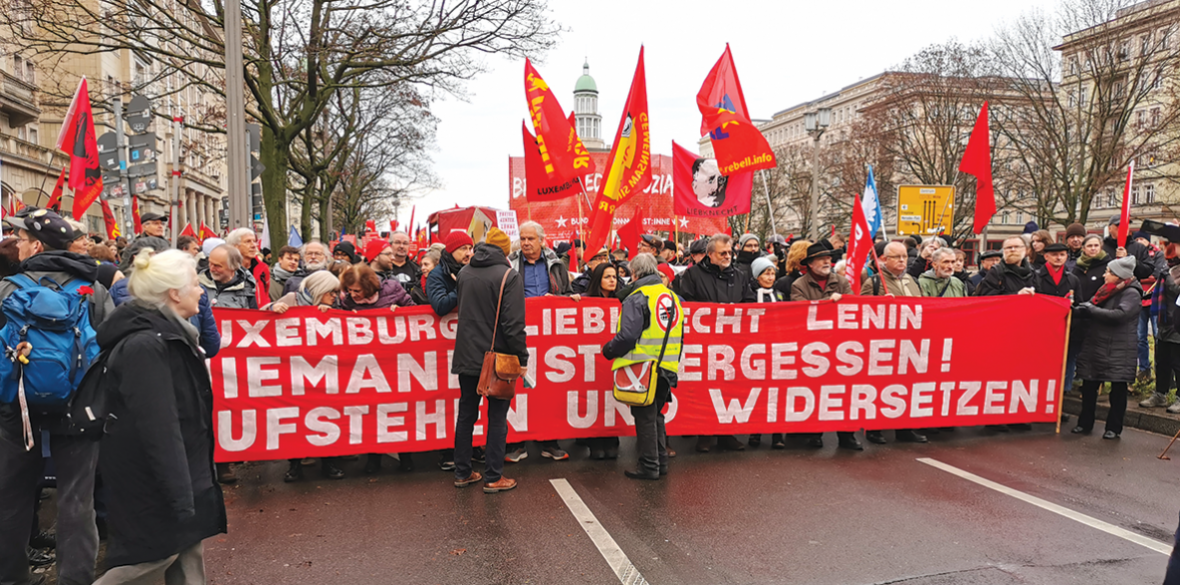This is the last article you can read this month
You can read more article this month
You can read more articles this month
Sorry your limit is up for this month
Reset on:
Please help support the Morning Star by subscribing here
STOPPING World War III means winning a wider understanding of the dual nature of today’s war, left politicians and activists argued at the 2023 Rosa Luxemburg Conference.
“The proxy war fought with Russia is linked to an internal social war on the working class,” Die Linke (The Left) Bundestag member Sevim Dagdelen pointed out, saying German workers had seen the fastest drop in real wages since the founding of the Federal Republic — with inflation meaning a worker on minimum wage had lost the equivalent of an entire month’s income in the last year.
At the same time German companies listed on the Dax index had paid out a record €55 billion in dividends, a new record.
“This is a brutal policy of upward distribution of wealth.”
Elaborating on the theme as we marched from Frankfurter Tor to Luxemburg and Karl Liebknecht’s graves the following day, Dagdelen notes that extreme poverty is becoming common in one of the world’s richest countries: “Over two million people in Germany have been forced to rely on foodbanks.
“So on the one hand you have the war in Ukraine and the weapons deliveries, but on the other you have a war against your own population and it’s because of the sanctions [on Russia] — the sanctions are why so many people are losing income” (both through inflation and job losses).
“If the unions, if the Left Party [Die Linke] do not take on this question of the impact of the sanctions, people will stay away.
“The root of the problem is the sanctions, the economic war against Russia. People are getting poorer and poorer, deindustrialisation is happening in Germany.”
Would she say Europe is paying the price of a war in the interests of the US ruling class?
“Yes. It is the US which wants to fight Russia to the last Ukrainian, without putting its soldiers on the front line. They will not send Abrams tanks to Ukraine; but they are putting pressure on Germany to send Leopard II tanks.”
Dagdelen points out that the cost of gas in Germany is now 10 times higher than in the United States, leading German companies to shift manufacturing over there, and the Joe Biden administration is quite happy to pass measures like the Inflation Reduction Act that hurt European economies.
She also has little doubt that part of this economic strategy was the terrorist attack on the Nord Stream pipelines in September, noting that the US stated at the start of last year that it would stop Nord Stream 2 using any means necessary.
Reports on the investigation into these attacks have been held up again and again, and Western accusations that Russia sabotaged its own pipeline make little sense.
“This was a big terrorist attack on the sovereignty of Germany and all Europe,” Dagdelen fumes. “The US wants to destroy the Russian-German relationship for good.”
The risks being taken are extraordinary, as Marc Botenga, an MEP of the Workers Party of Belgium marching with us, points out.
“People are dying. You need to stop this war, so how are you going to do that?
“War can be stopped in two ways. By the complete destruction of the enemy, which in Russia’s case implies nuclear war — something that is being normalised now in political and media discussion. Or by diplomacy. We must make the case for diplomacy.”
Dagdelen agrees, adding that the constant escalation through delivery of more powerful weapons systems will logically end in direct Nato participation in the war — a third world war.
Dagdelen, like her close ally Sahra Wagenknecht, has called out the “self-inflicted wound” of current German support for US policy on Russia in the Bundestag, but is not pleased with the left’s response in general.
Die Linke has often failed to take any clear position on issues related to the war: “For two weeks we have been debating in the Bundestag whether to send Leopard II tanks to Ukraine. Yes or no. And there is no single press release, no statement from the Left Party leadership on this point. Nothing.” (Die Linke did finally express opposition to the move two days after we spoke).
“You know, in the animal world some animals can play dead to avoid getting hunted. But that’s in the animal world, not the political world! In politics you have to have a profile. Not mentioning core problems means you lose trust, and others take advantage.”
She notes grimly that the far-right Alternative for Germany is polling at 18 per cent now, streets ahead of Die Linke.
There have been rumours that Dagdelen and Wagenknecht are so fed up with Die Linke’s failure to challenge state policy on Ukraine and stand up for anti-imperialist and anti-militarist politics that they are planning a new political party, but just as when asked about this by Junge Welt editor Stefan Huth the evening before, she smilingly refuses to be drawn.
All she will say is that the left is “in a 1914 moment” — as when the Second International collapsed because social democratic parties supported their respective countries’ war efforts in WWI, abandoning their previous commitment to peace and anti-imperialism.
Rosa Luxemburg and Karl Liebknecht, to whose tombs we were marching, were lonely anti-war voices in the Germany of that time, but history has rated them rather more kindly than the ranks of so-called socialists who howled them down as traitors.









